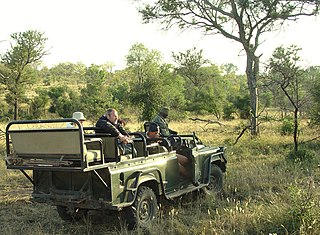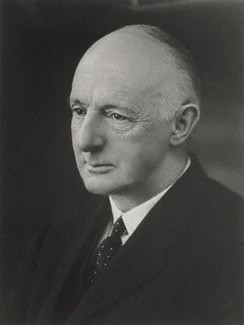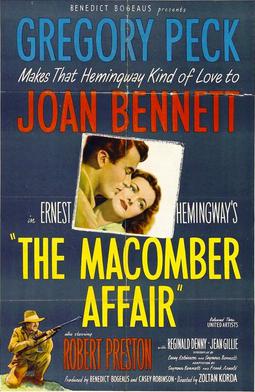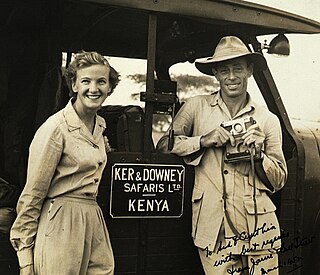
Maasai Mara, also sometimes spelled Masai Mara and locally known simply as The Mara, is a large national game reserve in Narok, Kenya, contiguous with the Serengeti National Park in Tanzania. It is named in honor of the Maasai people, the ancestral inhabitants of the area, who migrated to the area from the Nile Basin. Their description of the area when looked at from afar: "Mara" means "spotted" in the local Maasai language, due to the many short bushy trees which dot the landscape.

A safari is an overland journey to observe wild animals, especially in Southeast Africa. The so-called "Big Five" game animals of Africa – lion, leopard, rhinoceros, elephant, and Cape buffalo – particularly form an important part of the safari market, both for wildlife viewing and big-game hunting.

Robert Ruark was an American author, syndicated columnist, and big game hunter.

White hunter is a literary term used for professional big game hunters of European descent, from all over the world, who plied their trade in Africa, especially during the first half of the 20th century. The activity continues in the dozen African countries which still permit big-game hunting. White hunters derived their income from organizing and leading safaris for paying clients, or from the sale of ivory.
John Alexander Hunter was a white hunter in Africa from the early 1900s through the 1950s who led many notable safaris.

Hugh Cholmondeley, 3rd Baron Delamere,, styled The Honourable from birth until 1887, was a British peer. He was one of the first and most influential British settlers in Kenya.
Tsavo West National Park is located in the Coast Province of Kenya. The park covers an area of 9,065 square kilometres. The A109 road Nairobi-Mombasa and a railway divides it from the adjoining Tsavo East National Park. Together with adjoining ranches and protected areas, they comprise the Tsavo Conservation Area. Tsavo West is a more popular destination on account of its magnificent scenery, Mzima Springs, rich and varied wildlife, good road system, rhino reserve, rock climbing potential and guided walks along the Tsavo River. The park is operated by Kenya Wildlife Service.

The Macomber Affair is a 1947 film starring Gregory Peck, Joan Bennett, and Robert Preston. Directed by Zoltan Korda and distributed by United Artists it portrays a fatal love triangle set in British East Africa between a frustrated wife, a weak husband, and the professional hunter who comes between them.
Mombasa Air Safari is a Kenya coast scheduled airline.

Mombasa Air Services, a Kenya air charter firm, was created when John Cleave purchased Rapid Air, a Civil Aviation Board licensed air charter firm with bases in Nyeri and Diani Beach. Flight operations were switched to the coast city of Mombasa, to serve the newly growing coast tourism industry and the company name was changed to Mombasa Air Services. During the seventies, eighties and nineties, Mombasa was restricted by existent colonial legislation, from receiving international scheduled services, which were all directed to the capital city of Nairobi. During the seventies and eighties, the Kenya coast was a recently discovered exotic tourism destination and direct charter flights from Europe grew rapidly and many new beach hotels were built to receive an increasing number of tourist arrivals from Europe.
John Henry Selby was an African professional hunter who made a name for himself in Kenya and then in Bechuanaland. Selby honed his hunting skills early in life while working for the Safariland safari company and under the tutelage of legendary hunter Philip Percival. During his time with Ker & Downey Safaris, he also met and befriended Robert Ruark, whose subsequent writings about safaris he did with Selby made Selby famous around the world.
Philip Hope Percival (1886–1966) was a renowned white hunter and early safari guide in colonial Kenya. During his career, he guided Theodore Roosevelt, Baron Rothschild, and Ernest Hemingway on African hunts. Hemingway modelled the fictional hunter Robert Wilson in his story "The Short Happy Life of Francis Macomber" after Percival. Percival also worked with well-known white hunters like Bror von Blixen-Finecke and mentored Sydney Downey and Harry Selby, and was known in African hunting circles as the "Dean of Hunters".

Sydney Downey was a British-Kenyan professional hunter and safari pioneer. Always known as Syd, he learned the trade of guiding safari hunts from an older generation of professional hunters, including his early mentor Philip Percival. He teamed up with Donald Ker to create Ker and Downey Safaris Ltd., a company that was at the forefront of the move away from hunting and towards photographic safaris.

Elephant hunting, which used to be an accepted activity in Kenya, was banned in 1973, as was the ivory trade. Poaching continues, as there is still international demand for elephant tusks. Kenya pioneered the destruction of ivory as a way to combat this black market. Elephant poaching continues to pose a threat to the population.
The East African Professional Hunter's Association (EAPHA) was an organization of East African white hunters founded in Nairobi, Kenya in 1934. Well known members included Philip Percival, Harry Selby, Sydney Downey and Donald Ker. Their motto was nec timor nec temeritas, or "neither fear nor foolhardiness". The Association formed out of a desire to regulate hunting in the wake of technological developments like the safari vehicle, which had made accessing remote hunting areas much easier. During its existence it was able to accomplish much to conserve East African wildlife and become perhaps one of the most respected societies in the world of its kind. The Association was disbanded in 1977 when Kenya outlawed all big game hunting. The association's official records are held at the University of Florida, with selected photos and typescript documents available online.
Edgar Monsanto Queeny was an American businessman who served as chairman of the Monsanto corporation from 1928 until his retirement in 1960.

The Smithsonian–Roosevelt African Expedition was an expedition to tropical Africa in 1909-1911 led by former US President Theodore Roosevelt. It was funded by Andrew Carnegie and sponsored by the Smithsonian Institution. Its purpose was to collect specimens for the Smithsonian's new natural history museum, now known as the National Museum of Natural History. The expedition collected around 11,400 animal specimens, which took Smithsonian naturalists eight years to catalog. The trip involved political and social interactions with local leaders and dignitaries. Following the expedition, Roosevelt chronicled it in his book African Game Trails.

Muhammad Iqbal Mauladad (1926–1970), nicknamed Bali, was a big game hunter in Kenya.











